RE & Equality
Intent
At New Bewerley Community school, the aim of the Religious Education (RE) curriculum is to equip our pupils with the knowledge, understanding and skills to engage with diverse religious and non-religious perspectives, cultivating critical thinking, and developing their own beliefs and values in an ever-changing society. Our aim is to positively contribute towards the pupils’ personal development. Through engaging teaching and learning experiences, we aim to help children to develop understanding and a sense of respect for the diversity of our local and wider community as well as promoting the British Values of tolerance and co-operation in order to achieve community cohesion at all levels.
We provide pupils with opportunities to investigate and enquire about religious/non-religious beliefs and worldviews as well as recognising and celebrating their own beliefs. Through religious educational trips and visitor assemblies in school, pupils are engaged in the curriculum and get to explore how these experiences shape individuals and communities and may differ from their own experiences.
New Bewerley Community School follows the locally agreed Pennine Learning comprehensive syllabus Believing and Belonging. The syllabus states that it ‘reflects the twin aims that RE must stimulate interest and nurture understanding of religion/worldviews, while also contributing to pupils’ awareness of and sensitivity to diversity in our communities and world’. Currently, three core units based on the six pathways are taught in each year group, building upon prior learning. The RE curriculum is currently in its developmental stage and aims to include a further focus unit for each year group, to deepen knowledge and enrich the experiences of our pupils.
Through the use of the six learning pathways, pupils develop substantive knowledge of specific religions/worldviews. Teachers introduce and develop understanding of specific faiths incrementally so that all learners build substantive knowledge sequentially. Our RE curriculum emphasises on the importance of pupils and students encountering the lived experience of people in order to understand diversity within religions and worldviews.
Implementation
Although all areas of the EYFS goals are relevant, RE particularly supports development in Understanding the World and PSED. In the Early Years Foundation Stage (EYFS), RE is introduced through the exploration of special people, places, books, times and objects. Pupils listen to and talk about stories. They use their senses to explore religious beliefs, practices and forms of expression, developing their critical thinking skills. At New Bewerley, the EYFS builds a nurturing environment where our pupils appreciate that everyone is of equal importance and where diversity is celebrated.
In EYFS, children:
- Explore connections between special people, places, books, times and objects
- Use their curiosity to develop appreciation for the natural world
- Learn to appreciate and value themselves and others
In Key Stage 1, RE teaching should be built around developing knowledge and understanding along the six pathways for learning. This should be linked to substantive knowledge about religions/worldviews. This is further developed in Key Stage 2. Pupils study core units of work based on the pathways, enriching and extending understanding of religions through deeper exploration of selected aspects.
The six pathways are:
- The nature of religion and belief
- Expressing belief
- A good life
- Personal journey
- Influence and authority
- The big picture
Each unit has been carefully planned out to build upon pupils’ previous learning, ensuring clear progression is being made. The units are taught termly and include key vocabulary, knowledge organisers, retrieval tasks and opportunities for learning through lived experiences.
Example of a Knowledge Organiser - Y3
Assessment:
RE assessment is based on clear understanding of what the pupils are learning and how they are learning on a day-to-day basis. Formative assessment in lessons is used through methods such as retrieval tasks, careful questioning, quizzes etc. This builds a picture of pupils substantive knowledge, disciplinary knowledge and personal knowledge. Summative assessments are carried out at the end of each topics through a pre/post assessment sheet and teacher assessment.
Impact
At New Bewerley Community Primary School in Leeds, our RE curriculum is designed to embody our core values: Every Child, Everyday... Engaged in Learning, Prepared for Their Future, Nurtured for Growth. We aim for our pupils to value the diversity of our community, be respectful of and tolerant towards those with differing viewpoints, and to be independent thinkers who can make ethical judgements and answer the ‘big’ questions in their lives using appropriate sources of information to form their own opinions. We want our pupils to enjoy their RE lessons and inspire further study of this or related subjects, e.g. sociology, psychology, criminology, politics, etc.
By building a community where everyone collaborates, contributes, commits, creates, and celebrates, we ensure that our RE curriculum not only enriches students' academic development but also strengthens their sense of belonging and responsibility to one another and the world.
Equality
New Bewerley provides a curriculum that recognises that inequality can prevent learners from achieving their best outcomes. We provide a curriculum that includes all learners but we feel the humanities and MfL subjects are vital for providing all learners with opportunities to discuss diversity, heritage, ethnicity, race, injustice, and equality.
The school also provides a curriculum that meets the needs of all learners including SEND and More-Able. Please click on the link below to read the school's equality objectives. Also, visit the school Information Page to read about the Cultural Cohesion Quality Mark - this is an award we aim to achieve soon.

